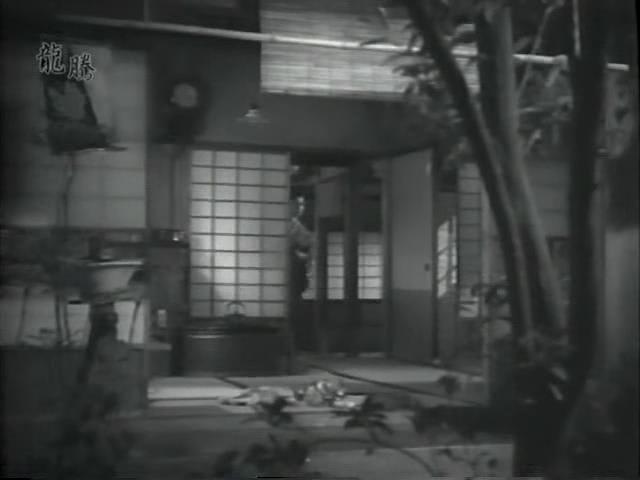A Page of Madness
One might free
the mad wife from her cell, if she wished to go, one can at least keep the
place clean and dignified.
An honest, clean
film on the subject (cp. Wiseman’s Titicut Follies), described by Time
Out Film Guide as “radical and challenging”.
The poetry of the
piece is the character of the madness, an incident with the baby at the water,
a final fit at the daughter’s wedding.
Some say there
was benshi, some say there
wasn’t. Some say Kinugasa knew The Cabinet of Dr. Caligari, some
say he didn’t, it figures as a joke in the film.
Jūjiro
A tale of the Yoshiwara
One
of the greatest magicians of the cinema, one of the greatest silent films, in a
rigorous technique and style native to Losey, for example (Secret Ceremony, Boom).
Dark street, man runs and falls, bleeding, he inspects the scene
alertly, enters room, crawls in darkness, lights lamp. “The
Sister”. “The Brother”. Did
he close the door? She’ll see, no, someone enters, climbs the stairs. “The Landlord”.
Crossroads, the title.
“No matter
what anyone says, the woman is mine” (cf. Thompson’s Brotherly Love, or Country Matters).
“The
Woman at the Archery Range”.
An extraordinary
review in the New York Times (where
it was Slums of Tokyo) finds
“the virtue of sincerity but its tempo is too heavy. Previous Japanese
films have been more successful than this. It may be that one is so accustomed
to seeing the Japanese portrayed in a frame of cherry blossoms or in stilted
legendary poses that genuine reactions having to do with murder, love or hate
seem foreign to the Nipponese” (it played the Fifty-Fifth Street
Playhouse with Parrott’s Blotto
and The Golden Kimono, “a
talking Japanese film”).
Time Out’s
version of British understatement is “certainly more than an archive
curiosity” (as Crossways).
“The
Constable” (more and more like one of Kobo Abe’s plays). “The Madam”.
As if to compensate for the Times’
complaint, one sees it now a little too fast for its own good, more than
likely. “Last Night’s Rival in the Fight” (a reminder also of
Sternberg’s The Salvation Hunters,
so categorical).
Gate of Hell
Kinugasa’s
masterpiece begins with Yoshitoshi perfectly rendered and continues throughout
in oft-remarked ukiyo-e for the cinema.
A coup
d’état that fails is the main image, examined in the love conceived by a
samurai of lesser rank for a lady-in-waiting he does not know at first is
married to a rival.
After opening in
the heat of the moment as described, Kinugasa brings the infinite number of
considerations in the play to bear upon his cinematography, which becomes
increasingly complex, varied and intricate, to leave nothing unexpressed.
Thematically, the
film is related to Kurosawa’s Sanshiro Sugata on a samurai’s
conversion.
Yushima no shiraume
Onna keizu

The title is
elsewhere given as Fukeizu yushimano hakubai, which evidently refers to the Plum Blossom
Festival at Yushima, or perhaps these are two
different films.
Early days of a
career, young scholar, cp. Jūjiro.
Stieglitz knows
the precise angle at which to grasp an entire building at once
architectonically, this ability is highly prized by Kinugasa for his
nineteenth-century city views, part of a general sense in which ukiyo-e can be understood cinematographically
in monochrome.
A stately, sedate
style, with all the activity confined to the pictorial lines in plenty, a rare
effect in the cinema.
A pickpocket hard
beset conceals a poke in a geisha’s obi,
than which no more elegant formulation exists.
The
flags of all the nations and a brass band, to begin with.
Question
of a lexicon. Camille and
Butterfly share the sound stage with the folly of men and much learning.
Yoso
The magical
powers to which the title refers include the flaying of a rat alive and the knotting
of a snake, by application of prayer beads. Ten years of study and meditation
are required for this.
The historical
monk Dōkyō raises the Empress from the
sickbed that is her court, governed by a corrupt minister who has in his sway
the Prince her son.
The supreme
elegance is to have this do-gooder fall in love and lose his magic.
As Beckett says,
|
sitôt sorti de l’ermitage |